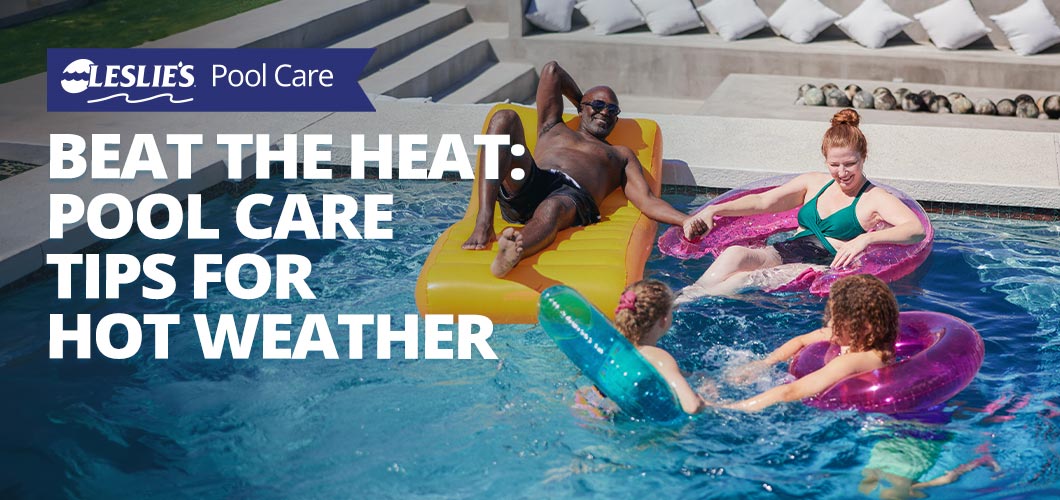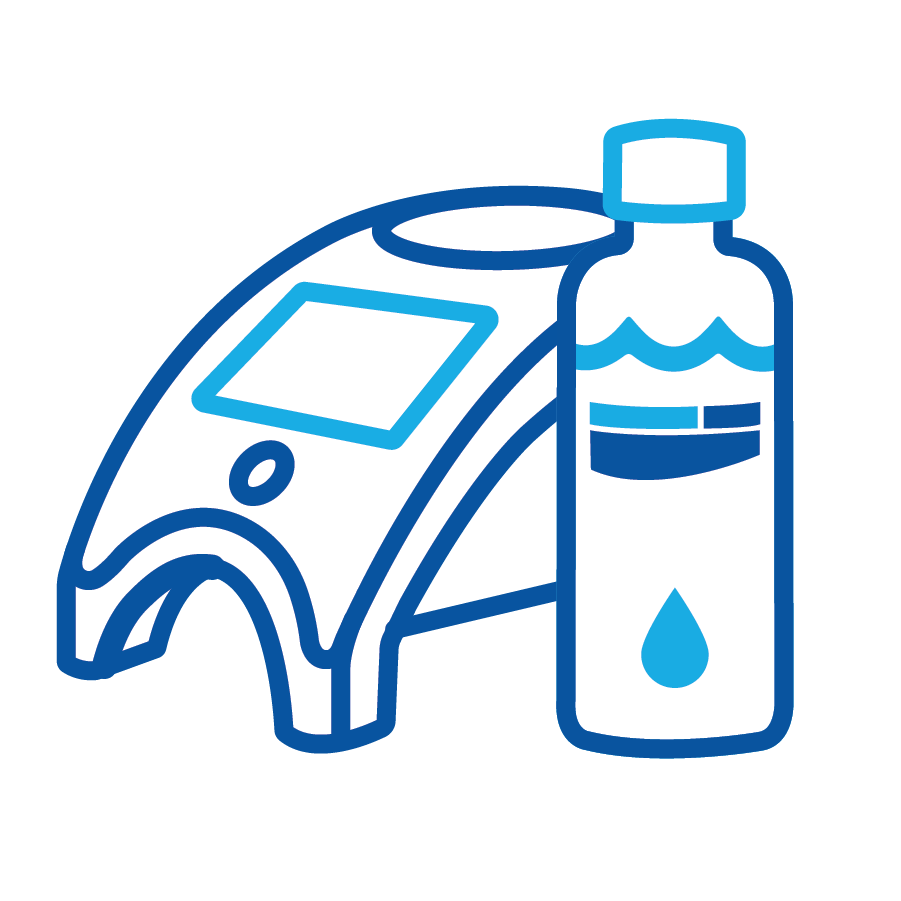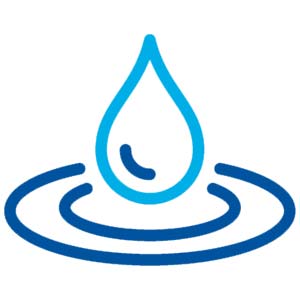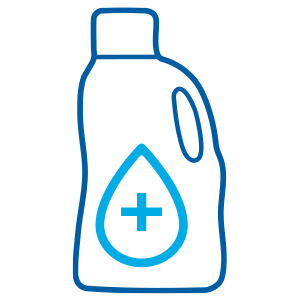
Beat the Heat: Pool Care Tips for Hot Weather
Swimming and lounging in the pool are quintessential summertime activities. However, warm summer temperatures usher in a unique set of challenges for pool owners. Of course, we're all familiar with the warnings to use sunscreen, stay hydrated, and keep cool whenever a heat wave strikes. However, your pool requires extra attention to stay healthy during warmer weather, too. As the water heats up, the pool gets used more often, algae activity increases, chlorine demand goes up, water chemistry changes rapidly, and evaporation happens faster than ever. Keeping your pool water clean and clear in hot weather can be tricky, but with the right tips, you can make sure your pool is always ready for a cool, refreshing swim.

1. Test Your Pool Water
When the weather gets warmer, the chemistry of your pool water can change quickly, and your pool may be more prone to scale buildup when conditions are right. To maintain safe, well-balanced pool water, you should test it often. In most cases, testing once per week is sufficient. However, when temperatures creep up above 90ºF, we recommend testing the water more often to keep a close eye on the health of your pool. For the most accurate and comprehensive results, just stop by your local Leslie's for a FREE 10-point AccuBlue® water test. In just 60 seconds, you'll also receive a FREE customized water treatment plan with step-by-step instructions catered to your pool, and our store associates can answer any questions you may have.
BONUS TIP: Bring the precision of our in-store water testing technology home to you! Now, with AccuBlue Home®, you'll enjoy the same in-store experience from the convenience of home with a sleek, modern-looking device that pairs seamlessly with the Leslie's app. The best part? It's a membership that pays for itself with $50 in monthly credits and a FREE water testing device.

2. Sanitize the Pool
Chlorine is the most popular sanitizer to keep your pool water clean and free of germs and algae. But in hot weather, chlorine can disappear from the water faster than normal. There are a few different reasons for this. First, warmer water temperatures promote the growth of germs and algae, which will use up your chlorine more quickly. Second, chemical reactions like chlorine oxidation happen much faster at higher temperatures, which can deplete chlorine levels rapidly. Also, outdoor pools need to pay particular attention to the Cyanuric Acid (CYA) level, as it protects your chlorine against breakdown under the sun's harsh UV rays.
To make sure your pool stays safe and sanitary, keep the Free Chlorine levels between 1–4 parts per million (ppm) at all times. Use a routine daily sanitizer, such as Leslie's 3" Jumbo Tabs, and shock the pool weekly to superchlorinate or oxidize the water. Check your chlorine levels regularly, and shock the pool with a chlorine-based product — such as Leslie's Power Powder Plus — whenever the level drops too low, or whenever the Total Available Chlorine level is more than 0.3 ppm higher than the Free Available Chlorine level.
If your Free Chlorine level is at least 2 ppm, you can use a non-chlorine shock like Leslie's Fresh 'N Clear to oxidize the water and break down skin-irritating, odor-causing chloramines in the pool. As an added bonus, you can use Fresh 'N Clear shortly before swimming to help keep swimmer contaminants under control — you can swim as soon as 15 minutes after application! Not sure which type of shock is best for your pool? Learn more in our Pool Shock Comparison Guide.

3. Prevent Algae
Algae loves warm water, and can quickly turn your pool green in hot weather if you're not careful. In addition to keeping your water sanitized and maintaining adequate chlorine levels, using algaecides can help prevent algae from growing in your pool. It's also a good idea to change up certain aspects of your pool care routine to account for the warmer weather and increased algae activity. This means testing your water more often to make sure the chlorine levels are just right, manually brushing the pool each week, and circulating the water longer every day...which leads us to our next point.

4. Increase Pump Run Time
When it's hot outside and algae is most active, it's important to keep the water moving to keep it from growing stagnant. It's much harder for algae to cling to surfaces if the water is in constant motion. Additionally, circulation helps distribute algae-killing chlorine throughout the pool, and your filter has more opportunity to remove contaminants and debris from the water.
As a rule of thumb, the warmer the weather, the longer you should run your pool pump each day. For single speed pumps, we suggest running the pump at least 1 hour for every 10ºF of air temperature. So, for example, if the temperature outside is 100ºF, you would run your single speed pump for 10 hours or more. Variable speed pumps are a little different since they run longer at slower speeds. Some pool owners will run their variable speed pumps 24/7 on low speed during the peak of summer, except when running on high speed to operate a pool cleaner, salt system, or other flow-dependent equipment. For more information about calculating the right pool pump run time, check out our Resource Center article.
DID YOU KNOW? Running your pump at different times of the day can serve different purposes in your pool care routine. You can learn more about choosing the best time to run your pump in our Resource Center.

5. Prevent Evaporation
In hot weather, your pool can lose thousands of gallons of water due to evaporation. On average, pools lose about 1/4 inch of water per day, but it can be as much as 1/2 inch per day in particularly hot, dry climates. This is where solar pool covers can help! Using a solar pool cover can reduce evaporation by as much as 95%. Not only does this save you lots of money on your monthly water bill, but it also helps the environment, and can also help reduce the amount of chemicals you use to keep your pool balanced and sanitized. Take a look at our Solar Pool Cover Buyer's Guide to learn more about the ins and outs of solar covers.
6. Use Specialty Chemicals

Despite the extra challenges of warmer weather, there are plenty of ways to help keep your pool water clean, safe, and beautiful through the hottest days of summer. For example, incorporating Leslie's Perfect Weekly into your pool care routine can offer all kinds of benefits. For starters, Perfect Weekly prevents the buildup of problem-causing phosphates in your pool. Not only are phosphates a primary food source for algae, but they can also contribute to the buildup of calcium phosphate scale, which diminishes your pool's appearance and can impact the efficiency of your pool equipment.
In addition, Perfect Weekly contains enzymes, which help break down non-living organic contaminants in the pool, including body oils, cosmetics, sunscreen, lotions, and more. The result is a cleaner pool and reduced demands on your available chlorine, all with less effort on your part. Last but not least, Perfect Weekly includes a liquid solar cover to reduce the rate of evaporation from your pool. It's the ultimate hot-weather pool chemical to have on hand.
Keep Cool in Your Pool!
You're probably familiar with all the different ways to take care of yourself during a heat wave — staying hydrated, using sunscreen, and keeping yourself under shade when possible. However, you may not have known your pool required some extra TLC, too! Taking care of your pool during a heat wave usually means being a little more attentive to the water chemistry and running your pump longer. Just remember to test your water often, keep the pool's chlorine levels between 1–4 ppm, and step up your algae prevention routine to make sure the water stays clean, safe, beautiful, and ready to enjoy. Besides, when it's super hot outside, nothing feels more refreshing than taking a cool dip in the pool!
For more expert tips and advice on maintaining your pool through swimming season, stop by your local Leslie's to talk to one of our friendly pool care associates, or check out our online Resource Center and video library. You'll find all sorts of helpful information, including algae prevention tips, routine water care, and troubleshooting advice to make sure your pool stays in top shape all summer long.